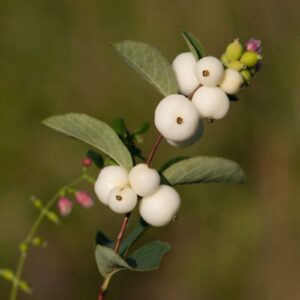Showing the single result
Wholesale Snowberry Shrubs in Michigan
Cold Stream Farm is proud to sell and ship wholesale Snowberry shrubs from our land in Free Soil, Michigan. We supply both bare root seedlings and snowberry transplants with no minimum order in the contiguous United States. Shipments to Canada, Alaska, and Hawaii may be possible with extra shipping fees, please contact us if you have any questions.
What to Know Before You Purchase Snowberry Shrubs
A Snowberry shrub (Symphoricarpos albus), also known as a “common snowberry,” is a native North American plant species and a member of the Honeysuckle family. Snowberry plants are hardy, ornamental, deciduous, and provide many useful resources for humans and animals alike.
How to Identify a Snowberry Shrub
A Snowberry plant bears both flowers and fruit on its branches reaching out from one main stem. The leaves are green in color and turn into a darker, more blue hue in the fall. Snowberry shrubs grow in dense thickets.
In June and July, Snowberry flowers will bloom into bright pink and white bunches. The fruit is then grown, sprouting small, white berries from which the plant gets its name. As the leaves fall and the fruit remains on the tree through the winter, unpicked berries will begin to turn brown.
Ideal Growing Conditions for Snowberry Shrubs
Most Snowberry shrubs are very hardy, capable of growing well in USDA zones 2 through 8. Snowberry shrubs can practically grow anywhere, able to adapt well to a wide range of soil and climate conditions.
Ideally, snowberry shrubs are grown in limestone or clay soil that is well-drained. Conditions may be slightly acidic to moderately alkaline (pH of 6.0 to 8.5) with growth possible in full shade, partial shade, and full sun conditions. For growing the most fruit and flowers, full sun is best.
Human Benefits and Uses of Snowberry Plants
Thanks to their ability to grow and propagate almost anywhere, snowberry plants are useful in erosion control and many other natural repair and restoration applications. Namely, snowberries have been used to provide ecological restoration in decommissioned mines and other subterranean disturbances.
With flowers, fruits, and the attraction of birds, Snowberry plants are also commonly used ornamentally to beautify a property. Although they may look ripe to the taste, humans should not eat the fruit from a Symphoricarpos albus plant. The berries are poisonous and will likely cause diarrhea or vomiting.
Native Americans are known to have used Snowberry wood to make sturdy arrows. Parts of the plant have also been used in medicine, soaps, and lotions.
Ecology and Wildlife Interactions
Although poisonous to humans, many species of birds and mammals are attracted to snowberry plants for their delicious and edible fruit. Most commonly, snowberry plants are popular among pheasants, robins, songbirds, and grouse. On the ground, the berries may be eaten by livestock or native species like bighorn sheep, bears, elk, and more.
Not only do birds eat the snowberry shrub, but they are also very responsible for the propagation and naturalization of the species. Birds digest the seeds within the fruit and disperse them throughout their travels to replant new shrubs.
With their dense branches, it is also very common to find small mammals making a snowberry shrub into a living space. In fact, some gopher species even burrow beneath Snowberry bushes for extra shelter.
Issues and Maintenance
Of course, with their delicious fruit, Snowberry plants may attract unwanted visitors, especially if you’d like to keep bears out of your yard. Snowberry shrubs may need to be within a fenced area to prevent unfavorable ground guests from eating or potentially damaging your plants.
Although they are quite drought resistant, new snowberry plants will need moist, well-watered soil until they reach a mature height. Fertilization is helpful, but not necessary for a snowberry bush to grow and thrive.
The most common issue with maintaining Snowberry plants is identifying and removing potentially-harmful suckers. Suckers should be removed to best avoid complications from rusts, rots, and other diseases. Snowberry plants respond well to pruning, so monitoring and eliminating problem areas is relatively painless.
Where to Plant Your Snowberry Shrubs
As they can grow nearly anywhere, snowberry shrubs can be planted in most areas with decent air circulation. In the wild, they are most commonly found near riverbanks and swamps where they can easily grow to mature size. Of course, you can plant a snowberry shrub in nearly any garden or hillside within North America.
Order Your Snowberry Plants with Cold Stream Farm.
Please check our current availability of Snowberry (Symphoricarpos albus) plants to begin your purchase. If you have any questions about shipping from our farms in Michigan or future plant availability, feel free to contact us discuss your next Snowberry shrub order. For retail and wholesale trees, shrubs, and more, Cold Stream Farm can fulfill orders at any desired quantity.

